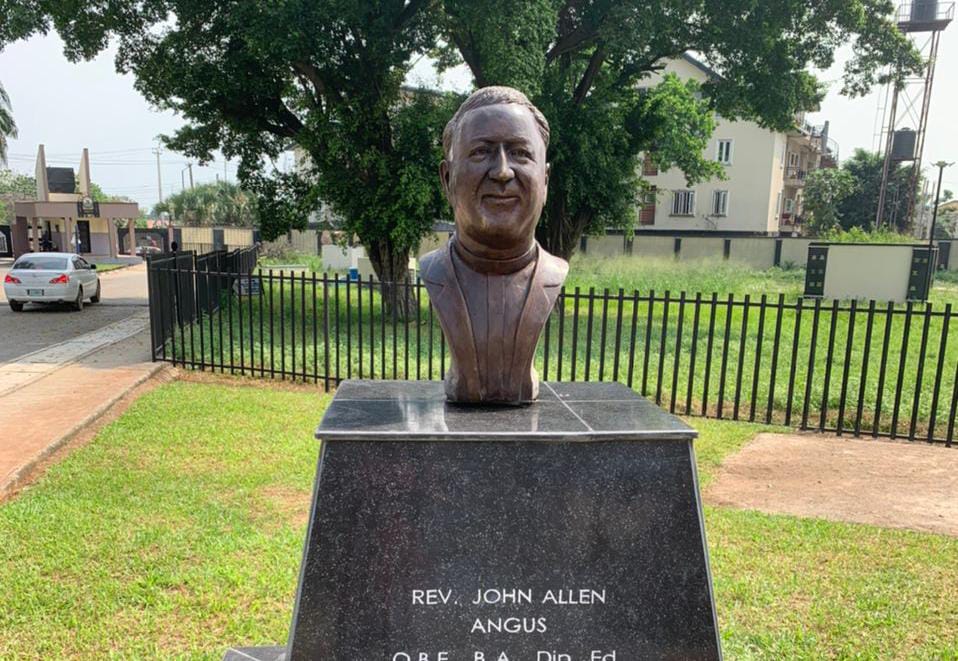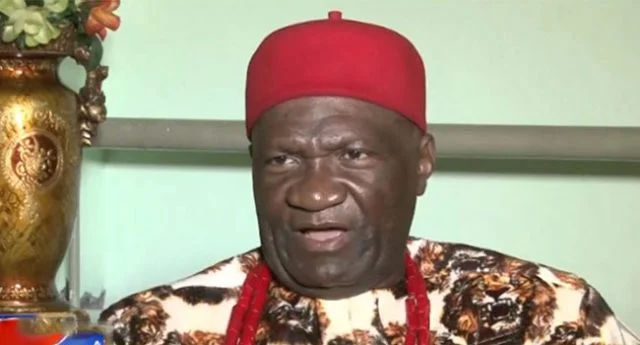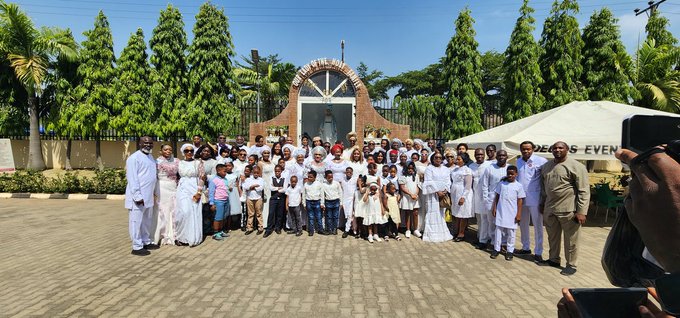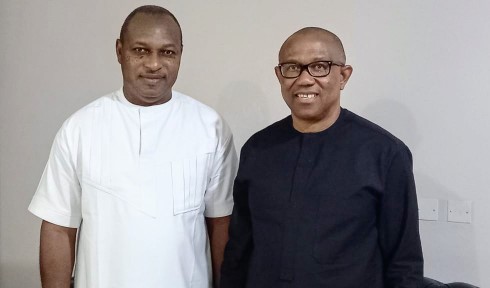The tribute was presented on December 4, 2022, at the unveiling of the bust of Reverend John Angus, the first principal of Igbobi College.
BY BOLAJI AKINYEMI
Now we praise great and famous men,
The fathers named in history;
And praise the Lord who now and then
Reveals in man his glory.
Praise we the wise and brave and strong,
Who graced their generation,
Who helped the right, and fought the wrong,
And made our folks a nation.
Praise we the great of heart and mind,
The Singers sweetly gifted,
Whose music like a mighty wind
The souls of men uplifted.
When Mark Anthony in Julius Caesar said the evil that men do lives after them, the good is often interred with their bones, obviously he was not thinking of Igbobi College and Reverend Angus.
When Reverend Angus left it, the College in 1944, which is about 78 years ago, little did he know that students that he never taught would be honouring him.
Advertisement
When Reverend Angus left Igbobi College 78 years ago, he would never have thought a boy born who was only two years old when he left Igbobi will be delivering a tribute to him.
When he left Igbobi College 78 years ago, he did not know that the good that he did would be remembered. I am sure that you will agree with me that we have just proved Marc Anthony wrong. The good that men do live after them. We have just proved it.
Fate, has a way of changing the destiny of man or to use the old cliché, man proposes God disposses. When Reverend Angus left England to come to Nigeria he was headed for service to the Wesleyan Mission wish we now call Methodist Mission in Nigeria, he had never heard of Igbobi College for the simple reason that the College did not exist.
Advertisement
He joined the Methodist Boys High School where he became the Principal. When the Methodist and the Anglican Missions decided to jointly establish a school for boys in Lagos, they decided on an experiment. Up onto that time schools were built on what you may call limited space experiment.
When they decided to establish the high school for boys, they decided that it was going to be on an expansiveness not limited by space. They moved out of built up Lagos towards the outskirt of Lagos into an area far removed from everywhere else. By the goodness and generosity of spirit of a Nigerian called Madam Tinubu, the two mission acquired 15 hectares which Madam Tinubu was using to cultivate Kolanut called Obi in Yoruba.
I have often wondered why the generosity of this departed old lady had not been recognised by the College. I suppose one set of old boys will find a befitting acknowledgement for the generosity of this grand old lady.
To go back to our preoccupation of Reverend Angus, this is an opportunity to speak to the innate good and the universality of the spirit of man. He epitomised the unity of the people of the United Kingdom of Great Britain and Nigeria in the pursuit of progress and happiness of mankind.
Advertisement
Over the centuries, they have in simple gestures demonstrated their love and concern for humanity.
How do we explain the life of this son of a clergyman born about 126 years ago in a village manse in Ponsanooth, Cornwall, England that spent virtually all his life for God, the good of country, mankind and the people he knew next to nothing about while growing up in the Cornish village.
The greatest and unique export of that village to Nigeria was the Reverend John Allen Angus. He attended Kingwood School in Bath, Somerset, England, the worlds oldest Methodist Educational Institution which parades alumnae akin to Igbobi College array of nation builders in Nigeria. He served in the First World War 1917-1918 where he walked into a pocket of mustard gas which was to have a grieveous effect on his sight and health in later years. The Reverend John Angus later attended Handsworth College, Birmingham, where he was awarded his BA and Diploma in Education. He was then admitted into the Wesleyan Mission as a minister.
This year marks a hundred years of John Allen Angus arrival in Nigeria on the staff of Wesleyan Boys High School now known as the Methodist Boys High School as Vice Principal of the secondary school. He later became the Principal between 1927 and 1931.
When Igbobi College was founded on 2nd February 1932, Reverend J Allen Angus was appointed the first Vice Principal. One would have expected that he would see this as demotion having been a Principal of a school for four years. But a man who saw his mission in life as being one of service, would go wherever the spirit would send him.
Advertisement
As I have said earlier man proposes God disposes. Within three weeks, there was a development as Rev. Angus became the substantive Principal of lgbobi College as the Reverend W. Waterton had to leave Nigeria on account of the ill health of Mrs. Waterton.
In March 1932 Reverend Angus having initially been appointed Acting Principal, was now elevated to the substantive post of Principal. For all practical purposes, Angus could be regarded as the first Principal.
Advertisement
The laying of the foundation of the College infrastructure, Academic, Spiritual, Ethical and Social bearings of the college which we all celebrate and were vividly captured in the College anthem were laid by the thoughts and toil of Rev. Angus and his team of workers at the inception of the College.
Reverend Angus was very particular about the religious side of the school. The boarders had their own morning and evening services every day, and the day scholars gathered in the old assembly hall cum Chapel for morning prayers.
Advertisement
On Friday afternoons, everybody joined in the closing services. The first subject every morning in all of the classes was Religious Knowledge. Boarders attended religious classes on Sundays, and had religious services every Sunday evening. The older boys were prepared for confirmation if they were Anglican and for recognition if they were Methodist. The boys were also led to conduct evangelistic prayer meetings in the surrounding villages of Bariga, Somolu or Abule George.
The name lgbobi was contracted from the Yoruba lgbo Obi (Kolanut Forest) the College was indeed referred to as the school in the forest or the school in the bush. There was no Orthopedic Hospital, Army Hospital, Higher College now called Yaba College of Technology, no WAEC office, no Myhoung Barracks. There were no roads in the vicinity, the Ikorodu Road was not in existence. The nearest buildings were the Infectious Disease Hospital (IDH), Magistrate Hagley and Barrister Kayode’s houses. There was no electric power supplies.
Advertisement
The terrain of the College then is better imagined in its tropical magnificence. The honour of turning such terrain to the cultured and controlled grass, flora, hedges, trees, orchards, buildings, lanes and lawns belong to Reverend Angus and his pioneering colleagues. They set the foundation building blocks.
Igbobi College legend has it that “all the pupils with the Masters and the Principal took part in destumping and weeding of the playing field every Monday afternoon and within a short time lgbobi College was able to boast of two full-size Football fields and a Cricket pitch”.
In the beginning students in form two, equivalent of standard six in Nigerian secondary schools, were obliged to take the first school leaving certificate examination but Reverend Angus did not agree with the education authorities and his stand was vindicated by the results of the 1932 examination. Therefore lgbobi College boys were not required to take this examination. The academic success of lgbobi College was spontaneous from the beginning with pupils performing exceptionally well in all examinations, Junior Cambridge and Senior Cambridge.
Sports, Games, Crafts, Literary and Debating Societies were all part of school life for every child. The spirit of philanthropy and benevolence were incorporated into the students by the weekly collection of Self Denial Fund (SDF) in class for support of charitable activities from whatever pocket money the boys had.
Discipline was not only by the Staff but also by the Prefects and senior boys. All of these contributed to the environment in which the Igbobi College tradition of high standard of liberal education combined with moral training was developed. Reverend Angus translated all those noble intentions of the proprietors into reality.
The outbreak of the Second World War with its attendant economic depression, social dislocations, restrictions, impacted on the development of Igbobi College as the need to provide accommodation for soldiers caused the relocation of the College to lbadan and also the prolonged absence of Reverend Angus. He relinquished the office of the Principal in 1944 when I was only two years old. His tenure was a period of laying the solid foundation on which the College stands to date. It was a foundation that anchored it against the storms of later developments that almost threatened its existence.
The College was originally established on 32 acres about 15 hectares parcel of land which was first conscripted into war efforts as barracks for soldiers during the Second World War. Later, It was one of the schools taken over by government in a compulsory acquisition as the premises was converted to serve about six secondary schools. It was the period of lgbobi I, lgbobi 2, Igbobi 3 to lgbobi 6. In addition, the College was converted into a multi-sex institution. When the school was finally returned to its original proprietors, only 7 out of the original 15 hectares was returned.
The foresight and diligence of the pioneering staff led by Reverend John Angus assisted in the re-creation of the College after its vicissitudes.
After leaving lgbobi College, Reverend Angus was elevated to become the Supervisor of Schools in the Western District of the Methodist Church between 1944 and 1946. After which he was promoted to be the Secretary of the Christian Council of Nigeria and Missionary Committee Representative 1946 to 1952.
In 1948 the Reverend Angus gave up his status as a bachelor when he married Miss Ada Poole of the Methodist Girls High School who became his life companion. She was a pillar of support to him in his failing health due to the repercussions of the mustard gas attack encountered during the First World War.
Between 1952 and 1957, he was the Chairman of the Western District of the Methodist Church.
The services rendered by our man, Reverend John Allen Angus, was noted and rewarded during the 1956 birthday celebrations of the Late Queen Elizabeth Il when he was conferred with the honour of Officer of the British Empire (OBE).
He returned to England in 1957 and spent his time touring even with his failing health and impaired sight sharing his experiences in Nigeria and the need to create a Conference of the Methodist Church in Nigeria.
He died in 1959 and bequeathed One thousand five hundred Pounds Sterling (#1500.00) each to Igbobi College and Methodist Boys High School in Lagos Nigeria.
The 70/72 set of the lgbobi College Old Boys Association has wisely thought it fit to define the College foundation through its first Principal in commemoration of the 50th/52nd Thanksgiving Anniversary of graduating from the College. This fitting Memorial to the selfless Missionary will also serve as evidence of the love and gratitude of we Nigerians who appreciated the life of dedication of Reverend John Allen Angus to the development of mankind.
It is only fitting that I end this tribute with the last two stanzas of this song composed by William G. Tarrant (1853 – 1928) when he wrote:
Praise we the peaceful men of skill,
Who built the homes of beauty,
And, rich in art, made richer still
The brotherhood of duty.
Praise we the glorious names we know,
And they whose names have perished,
Lost in the haze of long ago,
In silent love be cherished.
In peace their sacred ashes rest,
Fulfilled their day’s endeavor,
They blessed the earth, and they are blessed
Of God and man forever.
Bolaji Akinyemi, CFR, Fassn, Fniia, is
president and fellow of the Academy of International Affairs; and former minister of external affairs
Views expressed by contributors are strictly personal and not of TheCable.






